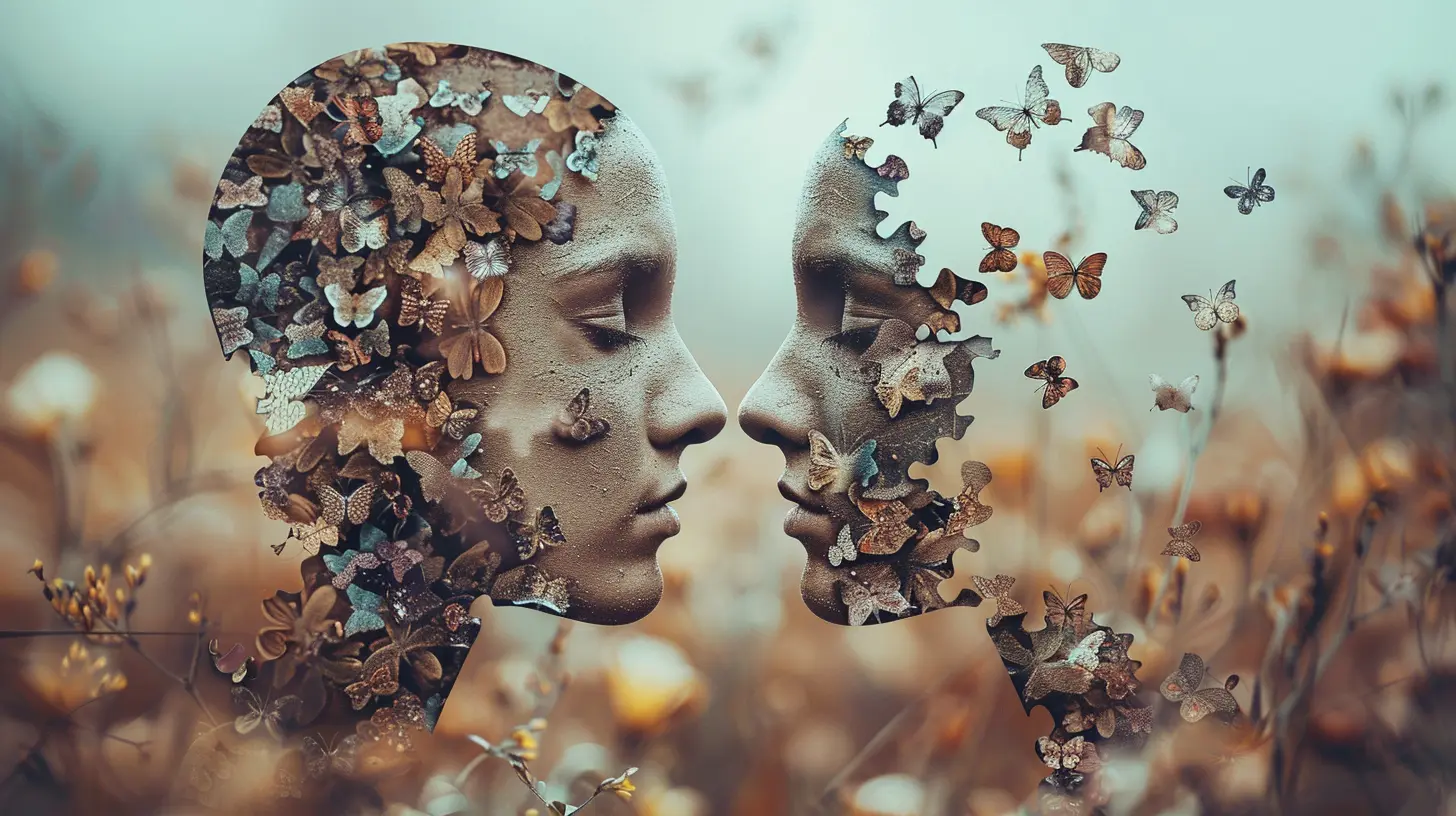How Psychotherapy Can Improve Your Relationships
25 September 2025
Let’s be real — relationships are hard. Whether it's romantic partners, family members, friends, or coworkers, maintaining healthy connections can be a rollercoaster. Misunderstandings, unspoken expectations, emotional baggage — you name it — all those things can quietly (or loudly) sneak in and mess up even the strongest of bonds.
But here’s the good news: psychotherapy can be a game-changer.
Psychotherapy isn’t just for people who are “broken” or going through something major. It’s like taking your car in for a tune-up — but for your mind, and ultimately, for your relationships too.
In this article, we’re diving deep into how psychotherapy can help reshape the way you connect with others — and possibly even change the way you view yourself along the way.
What Actually Is Psychotherapy?
Psychotherapy, often called talk therapy, is a mental health treatment where you talk with a trained therapist about your thoughts, emotions, behaviors, and life issues. It’s not just about venting (although that definitely helps sometimes). It's about gaining tools to understand yourself and the way you relate to the world.There are different styles of therapy — cognitive behavioral therapy (CBT), psychodynamic therapy, humanistic therapy, and more — but they all aim to help you make positive changes in your life.
Why Relationships Are So Complex
You ever wonder why relationships feel like walking through a maze blindfolded?It’s because we all bring our unique histories, insecurities, communication styles, and emotional patterns to the table. And without realizing it, we might be projecting old wounds onto new situations.
Maybe you have abandonment issues from childhood, or maybe you grew up in a household where emotions were brushed under the rug. These experiences shape how you connect with others — often in ways that aren’t obvious until things start falling apart.
The Link Between Mental Health and Relationships
Here’s the deal: how you feel inside impacts how you treat people on the outside.If you’re dealing with anxiety, depression, trauma, or low self-esteem, that affects your ability to be present, to communicate, and to trust. Even burnout from work can spill over into your personal life.
Psychotherapy helps you work through those internal struggles so you don't unknowingly take them out on the people you care about.
1. Therapy Teaches You How to Communicate Effectively
Communication is the lifeline of every relationship. But let's be honest, most of us were never taught how to actually do it well.Enter psychotherapy.
A good therapist acts like a communication coach. Through sessions, you’ll learn skills like:
- Active listening (not just waiting to talk)
- Expressing needs without blaming
- Setting healthy boundaries
- Managing conflict without going nuclear
These aren’t just buzzwords — they’re survival tools for making relationships thrive.
Imagine finally being able to say what you feel without it turning into a full-blown argument. That’s the power of therapy.
2. Therapy Helps You Understand Attachment Styles
Ever wonder why you chase after emotionally unavailable people? Or push people away the moment things get serious?It might have something to do with your attachment style.
Psychotherapy can help you uncover whether you lean anxious, avoidant, secure, or a mix of styles — and why that matters. Understanding your attachment style is like finding a map to your relationship patterns.
Once you’ve identified it, you can start making conscious choices instead of falling into the same painful loops again and again.
3. Therapy Enhances Emotional Intelligence
We often think being smart is all about IQ, but emotional intelligence (EQ) is just as important — especially in relationships.EQ includes:
- Recognizing your emotions
- Managing your emotions
- Understanding other people’s emotions
- Responding with empathy
Therapy is like a personal gym for building emotional intelligence. Over time, you'll become more attuned to your emotional triggers and learn how to regulate them.
So instead of reacting with anger or passive-aggressive jabs, you’ll start responding in ways that build connection, not break it.
4. Therapy Unpacks Past Trauma That Impacts Present Relationships
Trauma has a sneaky way of showing up where you least expect it.Maybe your partner says something totally harmless, but it triggers a deep emotional response that feels way out of proportion. That’s often unresolved trauma waving a red flag.
Therapists can guide you through that emotional minefield, helping you process painful memories and release them so they don't keep hijacking your current relationships.
It’s heavy work — but freeing.
5. Therapy Boosts Self-Esteem and Self-Worth
Here’s something not a lot of people talk about: your relationship with yourself sets the tone for every other relationship you’ll ever have.If you constantly feel unworthy or not good enough, you'll likely seek validation from others. That can lead to co-dependency, jealousy, or settling for less than you deserve.
Through therapy, you can start healing that inner dialogue. You learn to value yourself. To set boundaries. To stop people-pleasing.
When you feel grounded in who you are, you start attracting and keeping healthier relationships — and you stop tolerating toxic ones.
6. Couples Therapy Can Strengthen Relationship Foundations
Think of couples therapy as relationship school that most of us never went to.It’s not just for couples on the brink of breakup. Even strong couples can benefit from therapy — learning how to better support each other, revisit shared goals, or navigate big life changes.
A therapist provides a neutral space where both partners can express themselves without being interrupted, judged, or misunderstood. It’s like having a relationship translator who helps you finally “get” each other.
7. Therapy Encourages Accountability (Without Shame)
Let’s face it: it's hard to own your stuff. Especially when it’s easier to point fingers and say, “It’s not me, it’s them.”But therapy helps you see where you might be part of the problem — and how you can be part of the solution too.
This isn’t about blame or shame. It’s about responsibility — the good kind that empowers you to make changes instead of staying stuck in the same old story.
And when both people in a relationship are willing to do that work? That’s where the magic happens.
8. Therapy Helps You Navigate Life Transitions
Big changes — like moving in together, becoming parents, dealing with career shifts, grieving losses, or navigating new identities — can shake up even the most stable connections.Therapy gives you a safe space to process those shifts and how they affect your relationships. It can ease the growing pains and help you grow together instead of growing apart.
9. Therapy Can Help You Let Go of Toxic Relationships
Sometimes, the healthiest thing you can do is walk away.If you're stuck in a cycle with a toxic friend, partner, or family member, therapy can help you untangle your emotional attachments and gain the strength to set boundaries — or leave, if needed.
It's not easy, especially if guilt or fear is involved. But therapy reminds you that peace is more valuable than people-pleasing.
10. Therapy Creates A Ripple Effect
Here’s something beautiful: when you start doing the inner work, it doesn’t just benefit you. It inspires others around you to do the same.Your growth can ripple out into your relationships, leading to deeper conversations, better conflict resolution, and more emotional intimacy.
You might even become that friend or partner who listens better, communicates clearly, and radiates calm during tense moments. Who doesn’t want to be that person?
A Quick Reality Check: Therapy Isn’t a Magic Wand
Let’s be clear: therapy isn’t some overnight fix. It’s a process. Some sessions feel like breakthroughs; others feel like rambling through your thoughts and emotions. Both are valid.The key is to stick with it. Over time, the small shifts you make in therapy can lead to big changes in your relationships.
Therapy doesn’t give you perfect relationships — but it gives you the tools to build stronger, more fulfilling ones. And that’s pretty priceless.
How to Start?
If therapy sounds like a helpful next step, here are a few ways to get started:- Ask your doctor or a trusted friend for recommendations.
- Look up therapists in your area or online (many offer video sessions).
- Check directories like Psychology Today or TherapyDen.
- Interview a few therapists — the right fit matters more than you think.
Don’t wait until you’re in full-blown crisis mode. Start now. Your future relationships will thank you.
Final Thoughts
Psychotherapy isn’t just for solving big emotional problems — it’s a powerful tool for improving the quality of your relationships and your life.When you better understand yourself, you automatically show up better for the people around you. Whether it’s your partner, your family, your friends, or even your coworkers — everyone benefits when you do the inner work.
Sure, it takes vulnerability and effort. But so does love. And when love is grounded in clarity, communication, and emotional health? That’s when it becomes something truly life-changing.
all images in this post were generated using AI tools
Category:
PsychotherapyAuthor:

Janet Conrad
Discussion
rate this article
1 comments
Peregrine Warner
This article beautifully highlights the profound impact psychotherapy can have on relationships. By fostering self-awareness and communication skills, it equips individuals to navigate challenges more effectively. I appreciate the insightful examples and practical tips provided, which encourage readers to consider therapy as a valuable resource for nurturing their connections.
October 6, 2025 at 4:58 AM

Janet Conrad
Thank you for your thoughtful comment! I'm glad you found the examples and tips helpful in illustrating how psychotherapy can enhance relationships.


